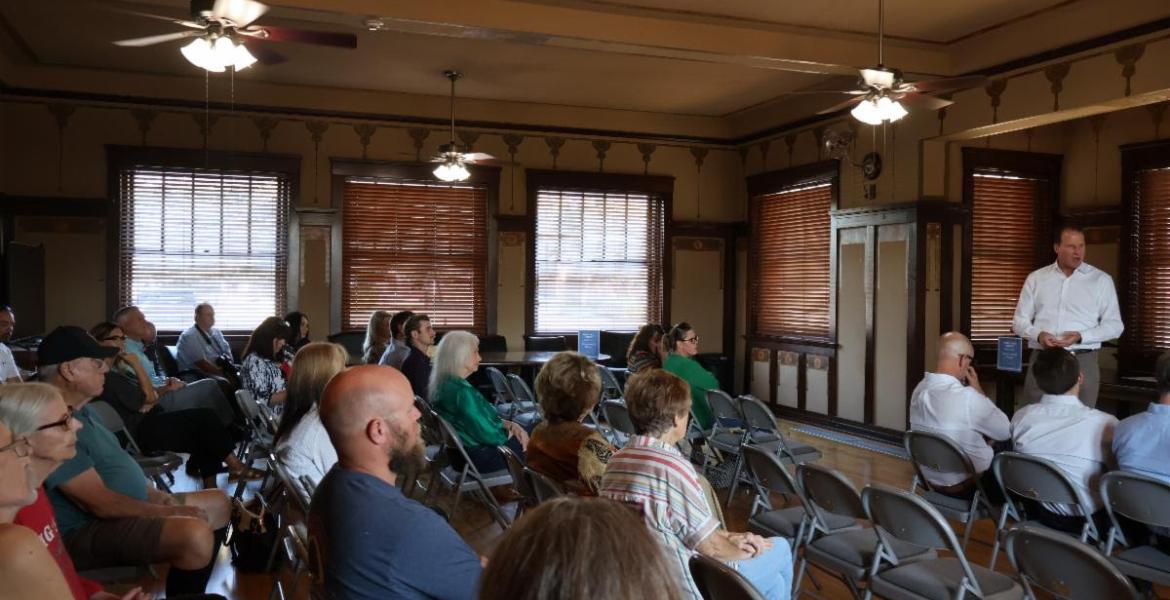For many, it’s been hard to miss: people walking with beaten sacks of belongings, asking for change, meandering over to Stephen’s Library each morning and into the Well’s Fargo building for cookies and juice. With the numbers on an apparent rise, does San Angelo have a growing homeless problem, or is the influx just a normal fluctuation in the yearly cycle typical for the summer months?
According to The Salvation Army of San Angelo’s Major David Feeser, the answer is a little hard to gage. Feeser says that last year the Emergency Shelter hosted an average 19-20 people a night, and that so far this year, “The number of people who have stayed has gone up, but the number we have fed has gone down a bit.”
Without an official registry or any identifying factors other than assumption, estimating the extent to which the rate has increased cannot be put into an accurate numerical value. But for those working in public service, the incremental incline is apparent.
“It seems that there has been a rise,” said Tom Green County Library System Director Larry D. Justiss. “We normally know the regulars—the ones that have been here for some time—but we have seen some new faces showing up. I can’t speak to the fact that they’re homeless or if they’re out of work, but I have seen an increase… in the past couple of months.”
In attempting to assess the root of the problem, one can only speculate. However there have been several indicators that show the rise may be linked to housing issues and the oil boom.
Major Feeser made reference to an article he read in the Odessa American about the housing crisis the area is currently experiencing, “I read, I think they have housing for 100,000 people and they have 140,000 living in town,” Feeser said. “If there’s not enough housing in Odessa/Midland, then we’re the obvious place they’re coming to.”
While San Angelo’s housing market is not nearly as volatile as that of the Permian Basin, we are starting to feel the aftershock, even with a number of housing developments currently underway to curtail the issues of a rapidly growing city.
“I’d probably say [we’re seeing an increase] because it’s so much harder to find a place,” Major Feeser said. “The people I’ve talked to, in some cases where they’ve been evicted, the landlord was going up on their rent considerably. I had one lady who was living in a house paying $500 rent, and when the lease was up the landlord went up to $1500.
“That’s the kind of situation we’re beginning to see. Apartments are wanting long-term rental agreements and it’s hard for the people that I’ve talked to to handle that kind of jump still on the income that they’ve got,” Major Feeser continued.
Even on the business end finding lodging is tight. San Angelo’s hotels are now full and must be booked in advance, sometimes as far ahead as a month. An oil company seeking housing recently approached the Salvation Army with an offer to rent 50 beds at the Lodge until a more permanent residency could be established, however Feeser says they just don’t have that space available.
“This housing crisis is really just a short-term thing until they get more homes and apartments built,” Feeser said. However the impact on local residents is becoming a pressing issue. “San Angelo is getting to the size now, where it’s come to this ‘homeless of the citizenry’, not just people coming into town. We’re getting to the size that we really have to address this issue,” Feeser said.
The effect of the rise is already being seen around town, specifically downtown in areas reachable by the Emergency Shelter and in buildings that offer public service. Since its relocation to 33 W. Beauregard, one of the businesses most directly impacted is the public library.
“We have had some issues in the library—we always have—but since we have moved to this building, its larger, there’s more space and sleeping has become an issue,” Justiss said.
Justiss also cited a few problems over the summer with the Library Café, which was more or less overrun by transients to the point that it could no longer be used for its intended purpose. “It just makes people feel uncomfortable,” Justiss said in reference to the groups who would sit and speak across tables using vulgar language or stare at others who meet there.
They also had an issue over the weekend involving two families who basically trashed the place. Justiss said they had “lived in one space for a while, then moved to the café and lived there for a while, and left trash and cookies and crackers all over the place.”
These kinds of instances, however do not happen often, and Justiss emphasized that he and his staff try to maintain a good relationship with all library visitors, regardless of social status.
“I have trouble with that term ‘homeless’ because I deal with the street population out here quite a bit, and there’s a lot of them that have been around for a long time. There’s a lot of issues why they're out there,” Justiss said. “What we find in dealing with [those that usually cause the problems]…is that they’re on the street for mental health issues.”
Justiss and his staff have had training with MHMR to help them understand people with special needs, and contact a mental health specialist if there is an incident with someone who has mental health issues.
The majority of the complaints, however, come from library visitors who have to walk through a cloud of smoke to enter the building. A city ordinance dictates that there is to be no smoking within 15 feet of the entrance to the building, however Justiss has often seen that the tables will be dragged closer to the door and that people smoke before the doors and throw their butts on the ground.
On these issues, and on sleeping, panhandling and verbal altercations, the library has strict policies; and they’re tightening up. “Everyone is free to come into the building and use our services,” Justiss said. “It is when they are not using our services in any way that it becomes an issue.”
A decisive action plan to lessen the concern about adequate housing and its effects on the community is difficult to define, however the Salvation Army is beginning a new program as of Oct. 1 which they hope will alleviate some of the problems.
The program is called “Transitional Housing”, and the objective is to offer selected participants a place of residence with low nightly rates in order to provide the opportunity to save money for a home our apartment all their own.
While the Salvation Army Lodge typically only sees visitors stay from one to three weeks, the Transitional Housing project would host tenants for three to four months, and each participant would be required to take part in a financial course and to find a job.
“In Transitional Housing, the person will be on a flighting scale,” Major Feeser said. “The first month they’re there, they’ll pay $5 a night, the second month $7 a night, and in third month it goes up to $9.
“After 90 days we evaluate…once we’re comfortable that they can make it through, that they can survive, we’ll pay the first month’s rent, we get the utilities turned on, we give them furniture to get into their apartment or wherever they’re renting,” Major Feeser continued.
The Transitional Housing project is the first of its kind in San Angelo and will initially be set as a trial run. The Salvation Army administration is already looking at applicants for the pilot program, and will determine the future of the project based on the success measured after this trial.
The Salvation Army is funded largely by donations and is always in need of community support to keep its services running. Parties interested in contributing to the Salvation Army may make monetary donations or donate food, towels, sheets, toiletries and any of the other essentials to the offices at 215 Gillis St.
For more information on Salvation Army services, visit http://www.salvationarmy.org/
Subscribe to the LIVE! Daily
Required






Comments
- Log in or register to post comments
Permalink- Log in or register to post comments
PermalinkListed By: Chris Myers
- Log in or register to post comments
Permalink- Log in or register to post comments
PermalinkPost a comment to this article here: